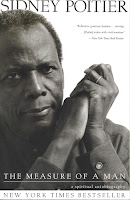The other reason why this book is worth reading resides in
the title. What is the measure of a man, the author asks himself. We know we
should be mild
on people. Do we have the right and the capability to take the measure of a man? The author refers to his father, who repeatedly claimed the measure of
a man resides in his ability to provide for his children. As his father was a
poor man, he certainly must have meant provision in the material sense, but it was much
more than that. It was also the education he gave and his example of a decent life in courage and
integrity. Sidney Poitier sees the greatest part of his father’s legacy as the
knowledge that in discipline and commitment lies hope. Nevertheless, Poitier
remains realistic enough to see this will not solve all problems in society.
We tend to measure a man by his income. As a result, we live in idolatry for billionaires. The measure of a (wo)man should actually be estimated
by what (s)he brings to society, not by what (s)he gets from society.
It seems like Poitier's education didn't burden him too much with status anxiety. I also refer to my Dutch blog Elitaire
of egalitaire samenleving?

No comments:
Post a Comment